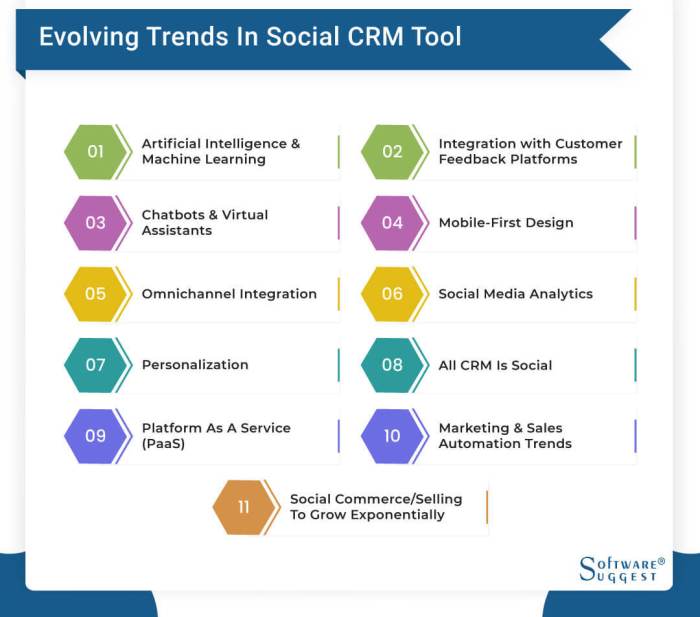Introduction to Social CRM and its Future
The Future of Social CRM: Trends and Predictions – Social CRM (Customer Relationship Management) integrates social media and networking capabilities into traditional CRM systems. It empowers businesses to engage with customers, build relationships, and provide personalized experiences across multiple social media platforms. As social media becomes increasingly prevalent in customer interactions, businesses must adapt to leverage its potential for enhanced customer engagement and satisfaction.
Social CRM presents both challenges and opportunities. Businesses must navigate the complexities of social media landscapes, monitor customer sentiment, and respond promptly to inquiries. However, it also offers the potential to gather valuable customer insights, build stronger relationships, and create a more personalized customer experience.
Growing Importance of Social Media in Customer Engagement
Social media has become an indispensable channel for customer engagement. Customers use social platforms to connect with brands, share their experiences, and seek support. Businesses that effectively engage with customers on social media can build brand loyalty, increase customer satisfaction, and generate leads.
- Customers expect businesses to be present and responsive on social media.
- Social media provides a direct line of communication between businesses and customers.
- Businesses can use social media to build relationships, provide support, and gather feedback.
Challenges and Opportunities for Businesses in Leveraging Social CRM
Leveraging social CRM effectively presents several challenges and opportunities for businesses:
- Challenges:
- Managing multiple social media platforms and monitoring customer interactions.
- Responding promptly to customer inquiries and resolving issues.
- Measuring the ROI of social CRM initiatives.
- Opportunities:
- Building stronger relationships with customers.
- Personalizing customer experiences.
- Generating leads and increasing sales.
Trends Shaping the Future of Social CRM
The future of social CRM is being shaped by several emerging trends in social media technology and the integration of social CRM with other business systems.
These trends include the rise of AI and machine learning in social CRM, the integration of social CRM with other business systems, and the increasing use of social media for customer service and support.
The Rise of AI and Machine Learning in Social CRM
AI and machine learning are being used to automate many tasks in social CRM, such as:
- Identifying and classifying customer inquiries
- Routing customer inquiries to the appropriate team or agent
- Generating automated responses to customer inquiries
- Providing personalized recommendations to customers
AI and machine learning can help social CRM teams to be more efficient and effective, and to provide better customer service.
The Integration of Social CRM with Other Business Systems
Social CRM is being integrated with other business systems, such as:
- CRM systems
- Marketing automation systems
- E-commerce systems
This integration allows businesses to have a single view of the customer, and to track customer interactions across all channels.
The Increasing Use of Social Media for Customer Service and Support, The Future of Social CRM: Trends and Predictions
Customers are increasingly using social media to contact businesses for customer service and support.
Businesses need to be able to respond to customer inquiries on social media quickly and efficiently.
Predictions for the Future of Social CRM
The future of social CRM is poised to be transformative, with advancements in technology and a growing reliance on social media for customer engagement. As we look ahead, we anticipate several key trends that will shape the evolution of social CRM.
Social CRM will become increasingly indispensable for businesses seeking to provide exceptional customer experiences. By leveraging the power of social media, organizations can gain valuable insights into customer preferences, resolve issues promptly, and foster stronger relationships.
The Role of Social Media in Customer Service and Support
Social media will continue to play a pivotal role in customer service and support. With the rise of social media-savvy customers, businesses will need to adapt their strategies to meet the demands of this evolving landscape.
- Real-time customer support: Social media provides a platform for businesses to offer real-time support, addressing customer inquiries and resolving issues promptly.
- Personalized support: Social CRM tools will enable businesses to personalize support experiences based on customer data, providing tailored solutions and recommendations.
- Sentiment analysis: Businesses will leverage social listening tools to analyze customer sentiment, identifying areas for improvement and proactively addressing potential issues.
The Potential for Social CRM to Drive Personalized Marketing Campaigns
Social CRM will empower businesses to drive highly personalized marketing campaigns that resonate with individual customers. By leveraging social data, organizations can tailor their messaging and promotions to meet specific needs and preferences.
- Targeted advertising: Social CRM will enable businesses to target their advertising campaigns based on social media data, reaching the right customers with the right message.
- Content personalization: Businesses will be able to create and deliver personalized content that aligns with the interests and preferences of their customers.
- Customer segmentation: Social CRM will facilitate the segmentation of customers based on social media data, allowing businesses to develop targeted marketing strategies for each segment.
Best Practices for Implementing Social CRM

Social CRM is a powerful tool that can help businesses connect with customers, build relationships, and drive sales. However, it’s important to implement social CRM in a way that is effective and efficient. Here are a few best practices to keep in mind:
First, it’s important to develop a clear social CRM strategy. This strategy should Artikel your goals for social CRM, the target audience you want to reach, and the channels you will use to reach them.
Monitoring and Analyzing Social Media Data
Once you have a social CRM strategy in place, you need to start monitoring and analyzing social media data. This data can help you understand what your customers are saying about your brand, what their needs and wants are, and how you can improve your products and services.
There are a number of different tools available to help you monitor and analyze social media data. Some of the most popular tools include Google Analytics, Hootsuite, and SproutSocial.
Measuring the Success of Social CRM Initiatives
It’s important to measure the success of your social CRM initiatives. This will help you determine what’s working and what’s not, and make adjustments as needed.
There are a number of different metrics you can use to measure the success of your social CRM initiatives. Some of the most common metrics include:
- Website traffic
- Social media engagement
- Customer satisfaction
- Sales
Case Studies and Examples

Social CRM has emerged as a powerful tool for businesses seeking to enhance customer engagement and drive revenue growth. Several notable case studies demonstrate the effectiveness of social CRM in practice.
One prominent example is Dell, which successfully leveraged social CRM to improve customer service. By monitoring social media channels, Dell identified customer concerns and resolved issues promptly, leading to increased customer satisfaction and brand loyalty.
Benefits of Social CRM
- Improved customer engagement
- Enhanced customer satisfaction
- Increased brand loyalty
- Revenue growth
Comparison of Social CRM Platforms
Various social CRM platforms are available, each offering unique features. The following table compares some popular platforms:
| Platform | Features |
|---|---|
| Salesforce Social Studio | Social media monitoring, engagement, and analytics |
| Sprout Social | Social media scheduling, analytics, and collaboration |
| Hootsuite | Social media management, analytics, and team collaboration |
| Buffer | Social media scheduling, analytics, and content curation |
Questions Often Asked: The Future Of Social CRM: Trends And Predictions
What are the key trends shaping the future of social CRM?
Emerging trends include the rise of AI and machine learning, the integration of social CRM with other business systems, and the increasing importance of social media in customer service and support.
How can businesses leverage social CRM to drive personalized marketing campaigns?
Social CRM enables businesses to gather valuable customer data, which can be used to create targeted and personalized marketing campaigns that resonate with specific customer segments.
